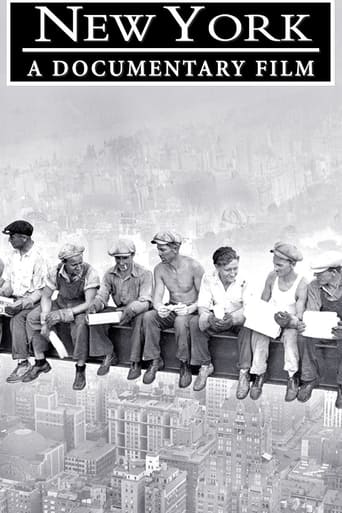mark.waltz
Both loved and loathed, the former New Amsterdam is arguably the best known city in the United States, the best known city under 500 years old, and love them or despise them, the tourist trap of all tourist traps. But how did that all begin? It's been documented in volumes of books, some now dusty archives in the bowels of the New York public library. It's a city of immigrants, a city of transients, a city of the proud native who wouldn't leave the city, let alone their neighborhood, for anything. This is a tale of how the five Burroughs got together as one mega city, how the names were influenced by its residents. Through readings, poetry of those who loved the city more than any other place on earth, through the memories of those still living remembering important people and events. Racial tensions, depression, war, political corruption, yet home to the greatest arts in America, that to rival the great museums and music halls and theaters of Europe.The seven part documentary focuses on the history, the very important people both good and bad, the architecture, the social impact of every race, religion, culture and creed and how the financial industry was formulated. Vintage footage dating back to the nineteenth century shows the growth of the city. Lovingly narrated by veteran stage, screen and TV actor Davis Ogden Steirs, this never drags. Impacts of the end of slavery resulting in race riots and the Triangle Fire with have you in shock over their impact on every level of humanity.Then there's the political machine, from the days of Alexander Hamilton (yes, the Hamilton of a certain rap musical drama) to Boss Tweed (a character in a forgotten musical called "Up in Central Park") to James J. Walker and Fiorello LaGuardia, subjects of their own Broadway shows. More famous and infamous New Yorkers are legendary today than residents of any other city. Is it any wonder that there are more songs about New York than any other city in the world?While this ends just before the tragedy of September 11, 2001, there's enough history here to keep you glued. In fact, there is enough history in New York City itself to have a weekly documentary for a full year. Memories of historical New York exists everywhere you go, and if this opens you up to taking a walking tour to see those places, don't be surprised to feel the presence of ghostly figures. This is a city that has seen its triumphs and tragedies, its cruelties and kindnesses, and the welcoming of those who sought a new life after hearing about that amazing lady with the torch who still guards our harbor today.
umpalmpa
This epic documentary from Ric Burns covers all of the major events and people that have shaped the culture and rich history of the City of New York. It does, in episodes 6 and 7 go past 1931 (Episode 6 is 1929-1941 and Episode 7 is 1945-Present). All of the historians, writers and others that provide commentary for the film are wonderful and insightful, although they sometimes become repetitive. This is rare, however, and the great stills (and later film) carries the story along from its humble Dutch beginnings in 1609 all the way to the present day. New York is like nowhere else in the world; it is an entity unto itself. But, as F. Scott Fitzgerald notes, it is just a city and not a universe. But what a city. David Ogden Stiers does an incredible job narrating what is, in my humble opinion, the singular film about the history of New York.
acton_bell01
While Ric Burns' documentary has been lauded for its comprehensive overview of NYC's history, it contains a number of unfortunate historical errors. Most of these are minor (saying, for instance, that Henry Hudson arrived in New York harbor in 1610 when it happened in 1609), but when they pile up, sentence upon sentence, episode after episode, it makes one wonder who fact-checked this series. More importantly, it makes the entire production suspect. If some of the facts are definitely wrong, how many others are wrong, too?
mcasano
Since my parents took me to a NYC automat when I was seven, I have always been fascinated by New York City. Ric Burns' documentary, "New York: A Documentary Film" made me love the city even more. I recently purchased the new 7 DVD set, which includes the recently completed episodes that brought the series up to 1999, before the tragedy of Sept. 11th. I was glued to the production immediately, from the majestic aerial footage to the great variety of historians, architects, writers and politicians who guide you through this historical tour. If you want to learn more about NYC, this documentary is your primer!

